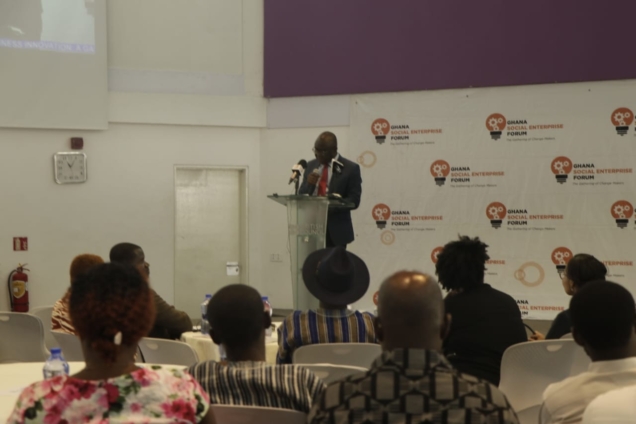The Deputy Agric Minister, Yaw Frimpong Addo, has encouraged farmers and agribusiness owners to use agribusiness as a platform to promote shared prosperity and wealth creation.
The keynote speaker at the Ghana Social Enterprise Forum at the British Council on the theme: Agribusiness Innovation: A Game Changer in Food Systems for Shared Prosperity" noted the relevance of innovation in the agribusiness sector.
He spoke about the need for agribusiness owners to adopt the technology needed to promote improved yield and productivity on farms and along the agribusiness value chain.
Yaw Frimpong Addo stated that government is taking a holistic approach to addressing the infrastructural needs of farming communities and their inclusion, Investing in irrigation systems to modernise Agriculture and ensure all year-round production.

“We at the Ministry of Food and Agriculture (MOFA), see Agribusiness as a food security issue and more importantly as a tool for economic transformation wealth creation and promoting shared prosperity,” he emphasised.
He seized the opportunity to encourage participants, especially the teeming youth to embrace the opportunity created under the Planting for Food and Jobs (PFJ)’s phase II for improved Food Security and shared prosperity.
Edwin Zu-Cudjoe, CEO of Social Enterprise Ghana (SEG), speaking to the media alongside the event, emphasised that agribusiness does not only provide a steady food supply but also contributes significantly to job creation, poverty reduction and overall economic growth.
Explaining further, SEG’s CEO, pointed out that its impact extends beyond the farm, influencing the entire food value chain and reinforces the foundation of resilient and prosperous societies.
“It is, therefore, imperative that we all support the Agribusiness sector to unravel its unparallel potential to minimise our current unemployment phenomenon,” he added.
Touching on expectations, Mr. Zu-Cudjoe, was optimistic the forum will foster insights into new ideas towards addressing teething challenges within the Agribusiness sector.
He bemoaned the absence of tailor-made solutions, programs as well as initiatives and policies to the works of SEs in the Agribusiness sector.
Furthermore, Mr Zu-Cudjoe expressed worry about the absence of young smart people in the Agribusiness ecosystem and was optimistic that the forum will look at how to engage these smart young people through the promotion of Technology and Vocational training.
Speaking on the theme ”Agribusiness Innovations: A Game Changer in Food Systems for Shared Prosperity,” he recalled SEG’s earlier research with support and funding from the GIZ Agribusiness focusing on the state of the Agribusiness sector.
Based on the report, Mr Zu-Cudjoe disclosed that Agribusinesses that are Social Enterprises, numbering over 200000 contribute more than $3 billion per annum to Ghana’s Gross Domestic Product (GDP) and in terms of job creation for the youth, they contribute more than one million jobs.
Delivering a solidarity message on behalf of GIZ, a key partner to SE Ghana, Bettina Schoop, Component Manager-GIZ Agribusiness, noted that SEG has played a key role over the years in fostering a dynamic ecosystem among Social Enterprises.

He said it has brought on board national, international and private sector stakeholders and supporters in strengthening innovation hubs and Social Entrepreneurs.
She described the forum as a perfect opportunity to discuss how to support the advocacy work of Social Enterprise Ghana.
Accordingly, Bettina Schoop, 84% of Social Enterprises surveyed, have not had access to finance in the form of a loan, equity or grant over the last five years.
Again, she disclosed that with Social Entrepreneurs playing an important role in the Agriculture sector and environmental problems, they also face structural challenges that hamper their development.
“SEs face limited access to finance, they often lack integration into Agriculture and Agro-industrial value chain in particular to assess quality import technologies but also to reach out to market,” she said.
The Ghana Social Enterprise Forum 2023 shed light on the remarkable advancements in the agricultural sector.
It highlights the transformative power of agribusiness innovations in addressing food security, promoting economic growth, and driving sustainable development in Ghana.
By prioritising collaboration and investment in these innovations, Ghana is poised to achieve greater prosperity, improve livelihoods, and contribute to a resilient and inclusive food system.
The objective was to highlight the significant role that agribusiness innovations play in transforming the food systems of Ghana.
The forum served as a platform for key industry players, social entrepreneurs, students, researchers, agribusiness owners, investors, and government stakeholders to share insights, discuss challenges, and explore potential solutions.
Latest Stories
-
I want to focus more on my education – Chidimma Adetshina quits pageantry
23 mins -
Priest replaced after Sabrina Carpenter shoots music video in his church
37 mins -
Duct-taped banana artwork sells for $6.2m in NYC
47 mins -
Arrest warrants issued for Netanyahu, Gallant and Hamas commander over alleged war crimes
50 mins -
Actors Jonathan Majors and Meagan Good are engaged
56 mins -
Expired rice saga: A ‘best before date’ can be extended – Food and Agriculture Engineer
1 hour -
Why I rejected Range Rover gift from a man – Tiwa Savage
1 hour -
KNUST Engineering College honours Telecel Ghana CEO at Alumni Excellence Awards
2 hours -
Postecoglou backs Bentancur appeal after ‘mistake’
2 hours -
#Manifesto debate: NDC to enact and pass National Climate Law – Prof Klutse
2 hours -
‘Everything a manager could wish for’ – Guardiola signs new deal
2 hours -
TEWU suspends strike after NLC directive, urges swift resolution of grievances
2 hours -
Netflix debuts Grain Media’s explosive film
3 hours -
‘Expired’ rice scandal: FDA is complicit; top officials must be fired – Ablakwa
3 hours -
#TheManifestoDebate: We’ll provide potable water, expand water distribution network – NDC
4 hours

